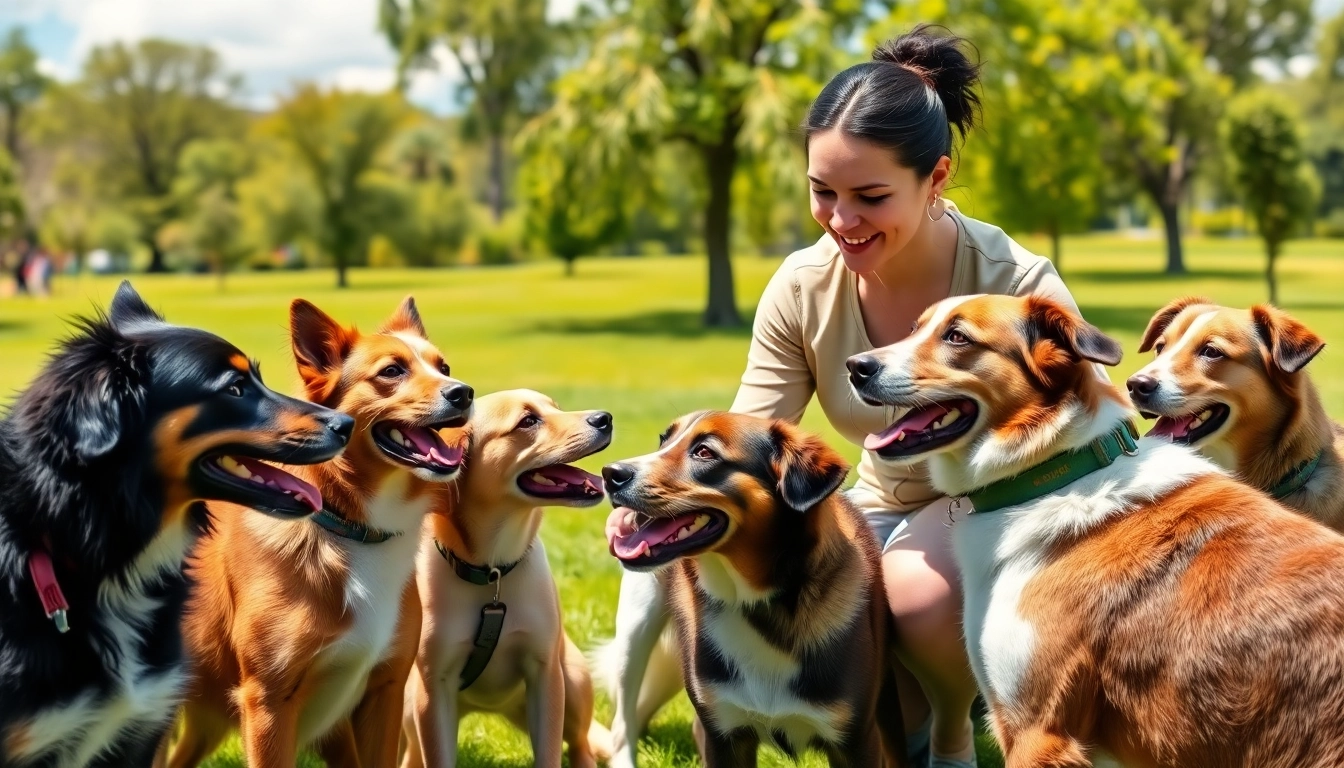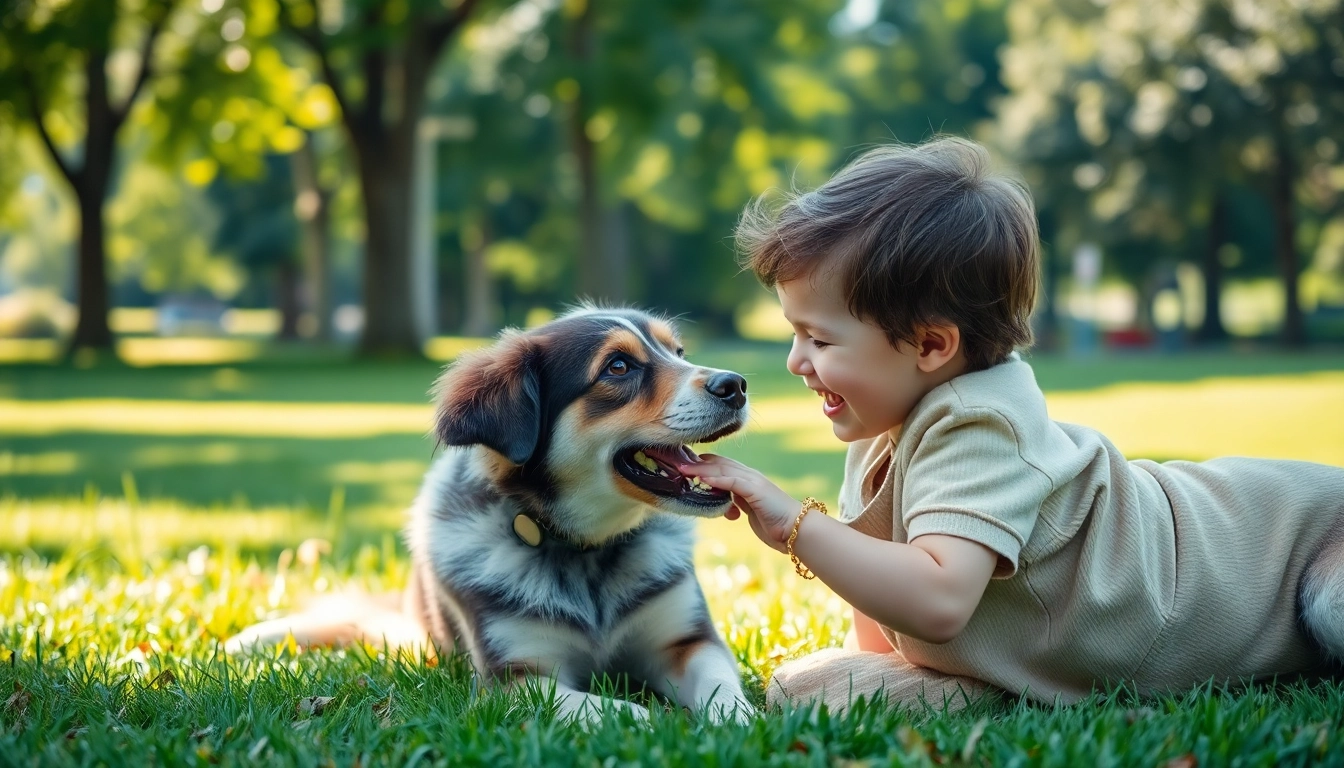Understanding Dog Training in Irvine
The Importance of Training for Your Dog
Dog training is an essential aspect of responsible pet ownership, especially in a bustling city like Irvine, where a dog’s behavior can significantly impact the community and its inhabitants. Training not only helps in establishing a well-behaved pet but also strengthens the bond between the dog and its owner. A well-trained dog is more likely to be friendly, social, and well-adjusted, enhancing its quality of life as well as the owner’s enjoyment.
Furthermore, effective training can help prevent the development of problematic behaviors, which can lead to issues such as aggression or anxiety. By pursuing Dog Training Irvine, dog owners in the area can ensure their pets become well-mannered companions.
Common Behavior Issues Addressed in Dog Training
Dogs, like humans, can exhibit a range of behaviors that may require correction. Some of the most common issues addressed in dog training include:
- Excessive Barking: Dogs may bark for various reasons, including boredom, frustration, or anxiety. Training can help teach dogs when barking is appropriate.
- Pulling on Leash: Many dogs pull excessively while on walks, making outings a chore for their owners. Training can provide techniques to manage this behavior effectively.
- Jumping on People: While a friendly greeting is natural for dogs, jumping can be unwelcome and even dangerous. Training can teach dogs more appropriate greetings.
- Aggression: This can manifest as growling, biting, or lunging and often stems from fear, anxiety, or poor socialization. Professional training is crucial for addressing aggression safely.
- Separation Anxiety: Many dogs struggle with being alone, which can lead to destructive behaviors. Training can help alleviate anxiety through desensitization techniques.
Overview of Dog Training Methods
Dog training methods vary widely and can be tailored to fit the unique personality and needs of each dog. Some of the most prevalent methods include:
- Positive Reinforcement: This approach rewards desirable behaviors with treats, praise, or play, encouraging dogs to repeat these behaviors.
- Clicker Training: Similar to positive reinforcement, clicker training uses a device that emits a sound to mark a specific behavior when it occurs, followed by a reward.
- Modeling and Social Learning: Observing other dogs can influence behavior, and trainers often employ this tactic to demonstrate desired behaviors.
- Electronic Training: Using tools such as e-collars can help with behavioral correction but should be used sparingly and under professional guidance to avoid causing harm or fear.
- Balanced Training: This combines positive reinforcement with corrections to address undesirable behaviors, emphasizing the need for balance in training techniques.
Choosing the Right Dog Trainer in Irvine
What to Look for in a Dog Training Expert
Selecting the right dog trainer is crucial for effective training. Here are some key factors to consider when looking for a trainer in Irvine:
- Qualifications and Credentials: Look for trainers who have formal education in animal behavior or psychology. Certification from recognized organizations such as the Association of Professional Dog Trainers (APDT) or the International Association of Canine Professionals (IACP) is a good indicator of expertise.
- Training Philosophy: Ensure the trainer’s approach aligns with your values regarding dog training. Many trainers specialize in positive reinforcement techniques, while others may focus on alternative methods.
- Experience: A trainer with a proven track record dealing with a variety of breeds and behavioral issues will likely be more effective. Experience with specific issues your dog may face is also a plus.
- Teaching Style: Observe the trainer’s interaction with dogs and owners during classes or sessions to ensure they communicate effectively and make training enjoyable.
- Flexibility: An ideal trainer will tailor their methods to fit your dog’s individual needs and adapt their strategies based on the dog’s progress.
Finding Reviews and Recommendations for Trainers
Word-of-mouth referrals can be invaluable in the search for a dog trainer. Start by asking fellow dog owners in Irvine, your veterinarian, or friends for recommendations. Additionally, online resources can provide insights:
- Yelp: A quick search can generate numerous reviews and ratings of dog training classes and trainers in Irvine.
- Social Media: Community groups on platforms like Facebook may offer recommendations or personal experiences with local trainers.
- Forums and Websites: Websites dedicated to pet care often have directories of trainers along with customer feedback.
Comparing Training Programs and Costs
Training programs can vary significantly in terms of length, content, and cost. When assessing options, consider the following:
- Types of Classes: Look for multiple offerings such as group classes, private sessions, or board and train programs. Each has its own advantages and disadvantages regarding socialization and personalized attention.
- Duration: Consider the number of sessions and the duration of each class, as this will affect total costs and training effectiveness.
- Pricing: Compare the programs in terms of cost. While investing in quality training is essential, ensure you understand what is included in the quoted rates to avoid any hidden fees.
- Money-Back Guarantee: Some trainers offer a satisfaction guarantee, allowing you to recoup your investment if you don’t see desired progress.
Positive Reinforcement Techniques
Benefits of Positive Reinforcement in Training
Positive reinforcement is widely regarded as one of the most effective training methods due to its many benefits:
- Improved Behavior: This method encourages repeat behaviors that are desirable, leading to long-term good habits.
- Stronger Bond: Rewarding your dog fosters trust and builds a stronger relationship between you and your pet.
- Reduced Fear and Anxiety: Unlike punishment-based methods, positive reinforcement promotes a stress-free training environment.
- Enhanced Learning: Dogs learn better in a positive environment, leading to faster acquisition of new skills and commands.
Tips for Effective Reward-Based Training
Implementing positive reinforcement in training can be straightforward if you keep a few key principles in mind:
- Immediate Reward: Deliver the reward immediately following the desired behavior to help the dog connect the behavior with the reward.
- Variety of Rewards: Use a mix of treats, toys, praise, and playtime to maintain your dog’s interest and engagement.
- Consistency is Key: Ensure that everyone in your household follows the same commands and techniques for the dog to avoid confusion.
- Gradually Reduce Treats: As your dog begins to understand commands, start to decrease the frequency of treats but continue verbal praise and affection.
Common Mistakes to Avoid
Even experienced dog owners can make mistakes when utilizing positive reinforcement. Here are a few pitfalls to avoid:
- Using Treats as a Bribe: Ensure that treats are a reward for good behavior, not a bribe to get the dog to comply.
- Praising Incorrect Behavior: Be cautious when providing praise; do not confuse your dog by rewarding the wrong actions.
- Inconsistency: Avoid varying your approach or rewards, as this can create confusion which undermines the training process.
- Withholding Rewards: Only withhold rewards if the dog is not executing the command correctly, rather than punishing them with frustration.
Advanced Dog Training Options
Specialized Training Programs Available
Irvine offers a variety of specialized training programs to cater to the diverse needs of dog owners. These include:
- Service Dog Training: Programs designed to train dogs to assist individuals with disabilities, often involving extensive training in public settings.
- Therapy Dog Programs: Classes that focus on preparing dogs to provide comfort and companionship in settings like hospitals and schools.
- Behavior Modification: Programs aimed at addressing specific issues such as aggression or fear to help dogs adapt to their environments.
- Agility Training: Activities designed for fun, exercise, and mental stimulation that improve a dog’s physical capabilities and response to commands.
Group Classes vs. Private Sessions: Pros and Cons
Choosing between group classes and private sessions will depend on your dog’s specific needs and your personal preferences. Here’s a comparison:
- Group Classes:
- Pros: Socialization opportunities; lower costs; learning from observing other dogs.
- Cons: Less personalized attention; potential distractions from other dogs.
- Private Sessions:
- Pros: Customized training plans; focused attention on specific issues; flexible scheduling.
- Cons: Higher costs; less chance for socialization with other dogs.
Assessing Your Dog’s Progress in Training
Tracking your dog’s training progress is essential for long-term success. Here are methods to assess their development:
- Behavior Diary: Keep a record of your dog’s behavior over time to spot improvements and areas needing attention.
- Regular Command Testing: Consistently test your dog on commands to gauge retention and understanding.
- Video Recording: Document training sessions to observe changes and consistency in your dog’s performance.
- Solicit Feedback: Ask for evaluations from trainers to receive expert insights on your dog’s behavior.
Local Resources for Dog Owners in Irvine
Dog Training Schools and Facilities in Irvine
Irvine is home to several reputable dog training schools and facilities, each offering unique programs to meet different needs:
- Manners for Mutts: Known for its focus on positive reinforcement and group classes.
- Paw Sweet Paw: Offers flexible training packages that cater to various schedules and goals.
- Wags and Wiggles: Provides comprehensive training options along with daycare and boarding services.
- OC Canine Coaching: Specializes in tailored training plans for behavioral issues such as anxiety and aggression.
Community Events and Activities for Dogs
Connecting with other dog owners and participating in community events is a great way to enhance your dog’s socialization:
- Dog Parks: Places like the Irvine Dog Park provide room for dogs to socialize and play in a secure environment.
- Pet Expos: Local expos often showcase various pet services, products, and trainers, giving owners plenty of networking opportunities.
- Monthly Meetups: Many community organizations host dog-friendly events encouraging socialization among pets and their owners.
Online Resources and Support Groups for Dog Owners
Modern pet owners can leverage online resources for assistance with training and community support:
- Facebook Groups: Numerous groups focus on dog training tips, resources, and advice from fellow trainers and dog owners.
- Websites: Various dedicated sites provide expert advice and articles on dog training topics, helping owners feel less isolated in their journeys.
- Video Platforms: Tutorials on platforms like YouTube can be beneficial for visual learners looking to implement training techniques at home.



